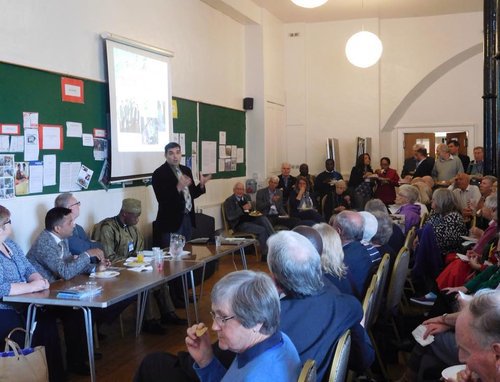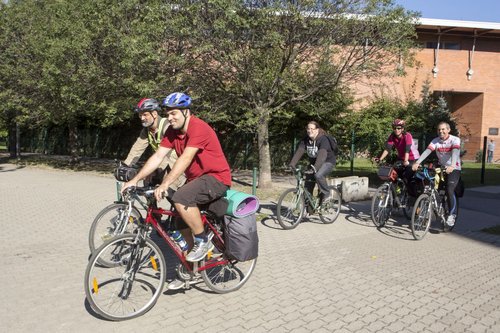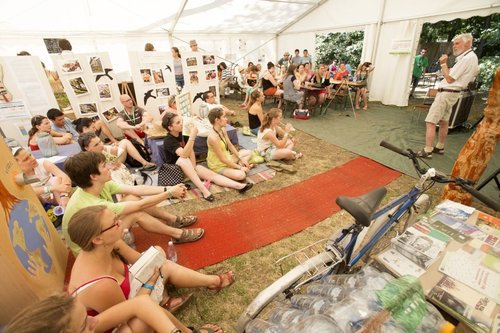An eco-justice partnership between the Church of Scotland and the RCH has recently been highlighted at the Church of Scotland’s General Assembly, held at the end of May 2016 in Edinburgh. Partner churches and their environmental stewardship efforts were detailed in a report produced by the Church of Scotland’s World Mission Council and included a section about the successful Eco-Congregation movement of the RCH.
A partnership started years ago between the Church of Scotland (CofS) and the Reformed Church in Hungary has recently been highlighted at the Church of Scotland’s General Assembly, held at the end of May 2016 in Edinburgh. The Church of Scotland’s World Mission Council focused their report this year on what their international partners are doing in regards to eco-justice in their part of the world, and the Eco-congregation movement of the RCH was specifically praised for its work. Due to this close connection and vested interest in the subject matter, Rev Tamás Kodácsy, Head of the Eco-Congregation Council of RCH, represented the RCH at this year’s General Assembly when the World Mission Council’s report was presented. The RCH’s Eco-Congregation Program was based on the same program in the CofS and has really taken off in its own right.

The RCH is committed to responsibility for the created world, and for this reason, similarly to the environmentally conscious program of the Church of Scotland, developed a voluntary program for environmental consciousness and protection aimed at Hungarian congregations and church institutions to help those willing to act. In Hungary, the Eco-Congregation Movement started in 2010. For a long time, there have already been many well-established examples abroad, such as in Scotland. Our Scottish brothers and sisters helped us enormously to put this idea into action at home. The Eco-Congregation Movement is directed by an advisory council consisting of believers who are experts in these subjects: researchers, environmentalists, engineers, and pastors. The Scottish-Hungarian project is managed by two core groups, one in Scotland and one in Hungary. The Hungarian core group is responsible for the events and project procedures taking place in Hungary, and they also handle the translation of all written materials related to the program.
The main goal of the Eco-Congregation movement is to help congregations experience the responsibility towards their environment along with the Christian faith. The movement seeks to aid in the spreading of an environmentally conscious attitude and thinking in the lives of believers.
Hungarian churches that can apply for the title of Eco-Congregation are those that take active steps to protect the created world through their daily efforts and overarching commitment to saving creation. If a congregation can show this initiative for four years, then they are eligible to receive the Eco-Congregation title and award which comes with a qualification plaque logo that can be used for three years, following the Scottish eco-congregation model. The congregations who apply for the Eco-Congregation title voluntarily accept that they will pay better attention to the aspects of creation care. Those congregations that already have a working and complex program of creation care in place will win the Eco-Congregation Award.
The Eco-Congregation movement seeks to empower and encourage churches in the RCH to think deeply about responsible stewardship of the world and to act in a manner that will create a more environmentally friendly society at large. This group is for everyone – all congregation members can participate in being good stewards of God’s creation. Local churches can work towards a more green future through scheduling congregational programming, buying produce from local farmers, being more aware of using the world’s resources in a sustainable manner, and celebrating Week of Creation.
Week of Creation is a time for churches to spotlight the created world and focus on ways to lessen their environmental impact through a theological lens. Last October a group of Hungarians from the Carpathian Basin set out on bike during Week of Creation, travelling from Beregszász (Berehove, Ukraine) to Sopron, Hungary as part of the Ecumenical Pilgrimage in Europe, whose final destination was the United Nations Climate Change Conference held in Paris at the end of 2015. The group sought to express both their solidarity with their neighbors who are gravely affected by the effects of climate change and their unity and willingness to act, by participating in this relay pilgrimage to Paris.

The Eco-Congregation program had its own meeting area during the 2015 Starpoint Youth Festival to encourage young people in the church to join a special journey to understand more about the world’s miracles and how they can contribute positively to the future of the created world. One of the reports on the 2015 Starpoint Youth Festival, in talking about the Eco-Church movement, proclaimed that, "If we will live like we do now, we will not have access to clean water, clean air and clean Earth. The Eco-Point helps us to learn how to live well and how the world can stay alive…if we do not take care of our home, (our children) will not be able to live on the Earth. It is God's creation, and as God trusts in us, we should trust in God and in other people, because without trust we cannot save the world."

The Eco-Congregation council of RCH recently held a conference from June 3-4 titled, “We Have One House,” a play on words in Hungarian as the word for church literally means, “one house.” The conference was ecumenical in nature and gathered professionals, church members from the RCH and its eco-congregation members, as well as climate engineers together in Debrecen. “We Have One House,” put a focus on theological approaches to sustainable development and it’s ecological aspects through various lectures, workshops, and roundtable discussions. Along with theoretical talks, the conference highlighted practical ways in which to implement the topics that were discussed with the aim giving tangible and concrete answers to the questions that were being asked.
The Eco-Congregation council is also involved in international cooperation and partnership and is currently a member of the European Christian Environmental Network (ECEN). The organization’s general meeting was held in Hungary in 2014 and the RCH’s Eco-Congregation program played a prominent role.
The RCH's Eco-Congregation Program is incorporated with a similar program from the RCH's partner, the Church of Scotland, and is widely supported by the Evangelical Church of Rhineland, which is an agreement with the RCH that is outlined within the church's partnership framework.
Written by Kearstin Bailey
Photos by reformatus.hu